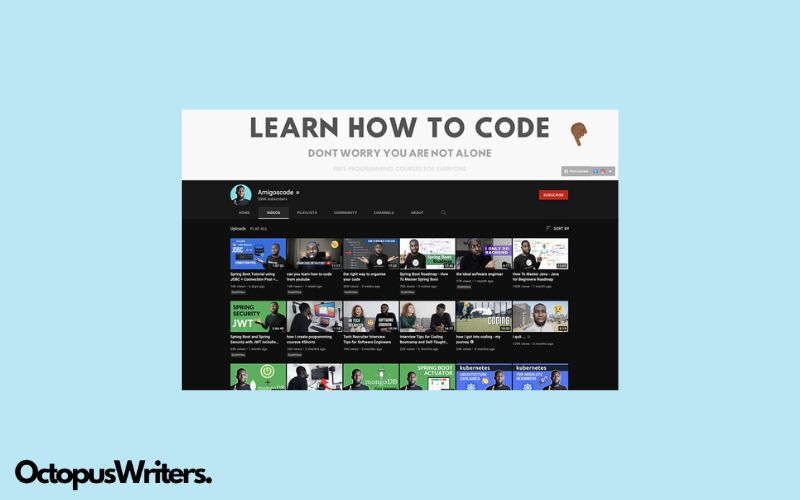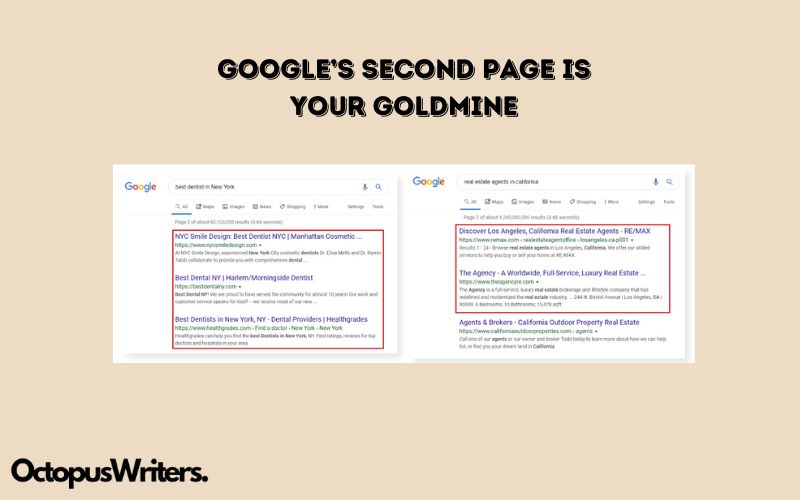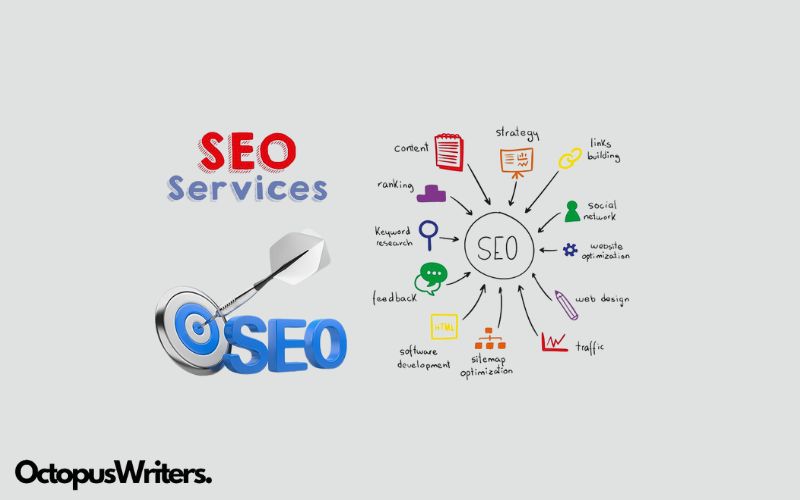SEO Clients, are you really leveraging the full potential of SEO in 2024? In a fiercely competitive digital world, if your website does not appear at the top of search results, you are missing out on a large number of potential customers. This article will help you better understand the importance of SEO and how to get your website to the top.
Let’s explore the most effective SEO strategies this year with OctopusWriters!
What is an SEO Client?
An SEO client is a business or individual that seeks to improve their online visibility and website ranking on search engines like Google, Bing, and Yahoo. These clients hire SEO professionals, agencies, or freelancers to implement strategies that enhance their website’s search engine optimization (SEO), helping them rank higher in search results and attract more organic traffic. SEO clients come from a variety of industries and sizes, ranging from local small businesses to large global enterprises, each with unique needs and goals.

SEO clients always need effective SEO campaigns.
An SEO client can be any entity that requires assistance with search engine optimization to improve their online presence. The scope of services can include technical SEO, on-page optimization, content development, link building, and monitoring of SEO performance. Clients may seek SEO for several reasons:
- Increase website traffic
- Boost brand awareness
- Drive sales and leads
- Improve user experience on their site
- Enhance local or global visibility online
Why Businesses Need SEO Services?
In today’s digital landscape, SEO has become essential for businesses to thrive online. Here’s why SEO services are critical:
Visibility in Search Engines: SEO ensures that a business’s website appears on the first page of search results for relevant keywords, making it easier for potential customers to find them.
Increased Organic Traffic: Effective SEO strategies help businesses attract targeted organic traffic, meaning visitors who are actively searching for their products or services.
Better User Experience: SEO involves improving the website’s technical performance (speed, mobile-friendliness, usability), which leads to a better user experience and can help reduce bounce rates.
Credibility and Trust: Websites that rank higher in search engine results are often perceived as more credible and trustworthy, making SEO a key factor in brand reputation.
Cost-Effective Marketing: Unlike paid advertising, organic search results do not require a continuous investment. Once a website ranks well, it can maintain its position for long periods without recurring costs.
Types of SEO Clients In 2024
Businesses from all sectors can benefit from SEO, but their needs often differ based on their size, business model, and target market. Here’s a look at the different types of SEO clients:
Small Businesses (Local SEO)

What SEO campaigns do small businesses need?
Focus: Targeting local customers through location-specific searches (e.g., “restaurants near me,” “plumbers in New York”).
Strategy: Local SEO strategies, including Google Business Profile optimization, local citations, and reviews, are essential for small businesses.
Examples: Cafes, local retail stores, plumbers, hair salons.
Challenges: Limited budgets, lack of technical expertise, competition with other local businesses.
Large Enterprises (National and International SEO)
Focus: Competing on a national or global scale, often for highly competitive keywords.
Strategy: Enterprise-level SEO includes large-scale technical SEO, content optimization for multiple languages or regions, and significant link-building efforts.
Examples: Multinational corporations, tech companies, global e-commerce platforms.
Challenges: Managing large websites, international SEO complexities, aligning SEO strategies across multiple teams and regions.
E-commerce Businesses
Focus: Driving product sales by ranking product pages and category pages on search engines.
Strategy: SEO for e-commerce focuses on optimizing product listings, using structured data, managing large amounts of content, and improving page speed for better user experience.
Examples: Online retailers like Shopify stores, Amazon sellers, and independent e-commerce sites.
Challenges: Large amounts of dynamic content, competition from marketplaces, ensuring fast loading speeds and a mobile-friendly site.
Startups and Growing Companies
Focus: Building brand awareness and growing traffic quickly to gain market share.
Strategy: Startups usually require SEO strategies that bring immediate and long-term results, combining organic growth with other digital marketing efforts.
Examples: SaaS platforms, tech startups, innovative consumer products.
Challenges: Limited resources and budgets, building domain authority from scratch, quickly adapting to market changes.
Agencies vs. Direct Clients
Agencies: SEO agencies often provide services to a range of clients across various industries. Their focus is on delivering high-quality, scalable solutions for multiple clients, often specializing in certain industries (e.g., healthcare, retail, etc.).
Challenges: Managing multiple clients simultaneously, balancing client expectations, and delivering consistent results across various sectors.
Direct Clients: These are businesses or individuals who directly hire SEO professionals or freelancers for personalized SEO services. They usually require more tailored services.
Challenges: Building trust with clients, maintaining transparency in results, and managing smaller budgets and individualized needs.
In conclusion, SEO clients vary greatly in size, goals, and challenges, but they all share a common need: to increase their online visibility and grow their business through improved search engine rankings.
How do I find people who need SEO?
Finding the right SEO clients is critical for building long-term relationships and ensuring successful projects. The following steps can help in identifying the best-fit clients:
Client Profiling

To have an effective SEO campaign, you need to understand your customers’ information.
Client profiling involves understanding the unique needs and characteristics of potential clients, including their industry, business size, and target audience.
Analyzing Industry, Business Size, and Target Audience: Different industries require different SEO strategies. For example, local SEO for a small business is much different from enterprise-level SEO for a large e-commerce company. Understanding the client’s target audience is essential to tailor the right keyword strategies, content, and technical optimizations.
Identifying Client Goals: Some clients want to increase organic traffic, while others aim to improve lead generation, boost e-commerce sales, or enhance brand visibility. Understanding these goals will help structure an SEO plan that aligns with their expectations and priorities.
Outbound vs. Inbound Marketing for SEO Clients
Importance of Personal Referrals and Networking: Referrals from satisfied clients can be one of the most effective ways to find new SEO clients. Networking at industry events, participating in online communities, and building relationships with other business owners can help attract qualified leads.
Using SEO Content, Case Studies, and Testimonials: Creating high-quality content that showcases SEO knowledge is essential for attracting inbound clients. Case studies and testimonials demonstrate previous successes, making potential clients more likely to trust your services.
Leveraging Social Media and LinkedIn to Connect with Potential Clients: Social media platforms, especially LinkedIn, can be powerful tools for generating leads. Regularly posting SEO-related content, engaging in conversations, and reaching out to prospects in your niche can help build credibility and attract clients.
Client Screening
Not every potential client will be a good fit, so it’s crucial to screen clients to ensure mutual success.
How to Qualify Clients for a Successful Partnership: Screening clients involves assessing their current SEO situation, business goals, budget, and willingness to commit to the SEO process. It’s important to understand whether the client is ready to invest time and resources into long-term SEO strategies.
Setting Expectations Before Starting: It’s essential to have an open conversation about expectations. This includes discussing the timeline for results, the strategies that will be used, the resources required, and the client’s involvement in the process. By setting realistic expectations upfront, both parties can avoid potential frustration down the road.
Finding the right SEO clients and navigating the challenges they face requires strategic planning, clear communication, and ongoing education. By understanding client needs and tailoring solutions to address common obstacles, SEO professionals can create successful and lasting partnerships.
Common Challenges Faced by SEO Clients
As an SEO client, it can be challenging to navigate the complexities of search engine optimization. From understanding the technical aspects of search algorithms to consistently creating high-quality content, there are numerous hurdles to overcome.
Lack of Knowledge about SEO

Lack of knowledge about SEO is one of the reasons why SEO campaigns fail.
Many businesses come into the world of SEO with limited knowledge of how it works, which can lead to confusion and misunderstandings during the process. Some of the key challenges under this category include:
Misunderstanding SEO Complexity: Clients often assume SEO is a quick fix, expecting immediate results after implementing changes. However, SEO is a long-term strategy that involves ongoing optimization efforts, technical updates, and content development. Misunderstanding the complexity of SEO can lead to frustration if results don’t appear right away.
Unrealistic Expectations: Many clients expect guaranteed top rankings on Google, often due to misconceptions or misleading claims from less ethical SEO providers. Managing expectations is crucial because SEO results take time, and even well-optimized sites may not reach #1 for highly competitive keywords.
Budget Constraints
SEO can be a significant investment, and many clients struggle to balance their budget with the level of service they require. The key challenges include:
Balancing Costs with SEO Strategies: Depending on the size of the business and the competitiveness of the industry, SEO costs can vary. Clients often need to decide between prioritizing more expensive, high-impact SEO strategies (like link building) and more affordable, slow-growth strategies (like content updates and on-page SEO).
Long-Term Investment vs. Short-Term Results: SEO is a long-term game, and clients with limited budgets may prioritize strategies that yield quick results. However, SEO’s true value lies in sustained efforts that build long-term rankings and visibility, requiring patience and investment.
Slow Results
SEO is not an overnight process, and many clients become discouraged if they don’t see immediate results. This can be a major challenge to keeping them engaged.
Why SEO Takes Time: Search engines like Google prioritize high-quality, authoritative websites. Building up this authority through content creation, link building, and technical improvements takes time. Rankings often fluctuate before stabilizing, and changes made today may take weeks or even months to impact search results.
Importance of Client Patience and Consistent Effort: Patience is key to SEO success. Clients need to understand that consistent, long-term effort is necessary to maintain rankings and achieve sustained organic traffic growth. Regular reporting, transparent communication, and education can help clients appreciate the gradual process.
Adapting to Algorithm Changes
Search engines, especially Google, continuously update their algorithms, which can impact a website’s ranking overnight. Keeping up with these changes is crucial for SEO clients, but it can be a challenge.

Always adapt to algorithms that will help you SEO successfully
Constant Updates from Google: Google makes hundreds of algorithm updates each year, some of which significantly affect website rankings. These updates prioritize different aspects of SEO, like content quality, user experience, or site speed, meaning that SEO strategies must constantly adapt.
How to Keep Up: Clients need to partner with SEO professionals who stay informed about algorithm changes. It’s essential to focus on fundamental SEO best practices like creating high-quality content, improving user experience, and maintaining a technically sound website to be resilient against such updates.
Get SEO Clients In 13 Ways For 2024
You can attract SEO clients for your business through a variety of lead generation methods, such as offering free SEO audits, sending cold emails, and sharing case studies or thought leadership content. In today’s crowded market of digital marketing agencies, it’s crucial to stand out. Getting SEO clients becomes easier once you’ve worked with clients and delivered tangible results. Satisfied customers will often refer other businesses to your SEO services.
Here are 13 strategies to land SEO clients for your business:
Define Your Niche
Offering general SEO services is no longer enough. Specializing in a particular industry or field can help you attract SEO clients who are specifically looking for targeted expertise. You can focus on areas like e-commerce SEO, content optimization, local SEO for small businesses, or SEO for specific sectors like healthcare or law. By narrowing your focus, you’ll better understand the unique needs of potential SEO clients and can tailor your services accordingly. While it’s important to choose the right niche at the right time, keep your expansion options open and stay aware of market trends to avoid limiting your agency’s growth.

For any SEO campaign, you need to find your own niche.
Develop a Strong Online Presence
Your agency’s online presence reflects your ability to deliver results for SEO clients. You should serve as a prime example of online success. While your focus is on clients, it’s also important to build your agency’s presence by creating a professional website, running a blog that offers SEO insights, and engaging on social media platforms like LinkedIn and Twitter. By actively sharing tips, participating in discussions, and offering advice, you can attract SEO clients and showcase your expertise. Engaging in online communities and providing helpful SEO insights tailored to business owners’ challenges will help establish credibility and generate leads.
Offer a Free SEO Service
Offering a free SEO audit or strategy to potential SEO clients may seem counterintuitive, but it can be a powerful lead generation tool. A free audit helps identify areas for improvement on their website without giving away the full execution details. Tools like Surfer Audit can help generate reports that highlight opportunities for growth. By offering a preview of your expertise, you’ll build trust with SEO clients and demonstrate the value you can bring to their business.
Use Case Studies and Testimonials
Case studies and client testimonials are invaluable tools for gaining the trust of potential SEO clients. Showcasing the success of past projects can provide tangible proof of your abilities. If you don’t yet have case studies, focus on gathering testimonials from satisfied SEO clients. Even a simple quote from a happy customer can be effective in building credibility until you have time to create detailed case studies.
Leverage Social Media

SEO Clients – Don’t Forget Social Media
Social media platforms are rich resources for finding and engaging SEO clients. Identify where your target clients are most active, such as LinkedIn, Facebook groups, or Twitter, and engage with them through discussions and content sharing. LinkedIn’s advanced search allows you to connect with business owners and decision-makers in your niche, while platforms like Instagram or Facebook offer opportunities to host live Q&A sessions or share valuable SEO tips. Engaging with potential SEO clients through meaningful content and active participation can help establish your reputation and attract qualified leads.
By using these strategies, you can effectively position yourself as a trusted expert and attract SEO clients who are eager to grow their online presence.
Cold Email Prospects
Cold emailing can be an effective method to quickly attract SEO clients when done correctly. Crafting the right message and sending it to the right people at the perfect time is crucial. For instance, you might start by complimenting the SEO client’s recent business achievements, then point out an SEO issue on their website, and offer a few tips to improve it.
Here’s a template you can customize for your industry:
Subject: [First Name], Let’s Boost [Company Name]’s Google Ranking!
Email:
Hello [First Name],
While researching [Keyword] on Google, I noticed that [Company Name] isn’t appearing on the first page. You’re currently at position [Current Rank].
Your website has [a positive aspect], but being on page [Current Page Rank] means you’re missing out on potential SEO client opportunities.
I’ve successfully improved rankings for various [Niche/Business Type] in [City]. Here’s [Proof] to illustrate my point.
Given [positive aspects], I believe [Company Name] has a great chance to surpass competitors like [competitor 1] and [competitor 2].
If you’re interested in learning more, just reply to this email and I’ll be happy to assist. If I should contact someone else regarding this, please point me in the right direction.
Looking forward to hearing from you!
Best Regards,
[Your Full Contact Information]
Be sure to clearly communicate how your service can benefit SEO clients and use an engaging subject line to increase open rates. Personalizing your emails and providing value will significantly improve your chances of landing new SEO clients.
Showcase Your Expertise with SEO and Content Marketing

Content Marketing is one of the factors that help your SEO campaign succeed.
Showcasing your knowledge through your own platforms is an excellent way to attract SEO clients and prove your expertise. You should implement SEO best practices on your own website to demonstrate success. High-quality content that adds value and ranks well in search engines not only attracts organic traffic but also serves as a testament to your ability to help SEO clients.
For instance, if a lead searches for “SEO services in [your city]” and finds your site at the top of the search results, it positions you as a trusted expert. Share actionable content that addresses the challenges your SEO clients face, and amplify this content on social media, in newsletters, and in relevant online communities.
Establish a Unique Selling Proposition (USP)
Many SEO providers claim to be “the best” or boast about their “proven track record,” but to attract SEO clients, you need a compelling USP that clearly defines what sets your agency apart. A strong USP highlights the unique value you bring to the table for SEO clients and gives them a reason to choose you over competitors. If your strength lies in link building for a specific industry, make sure that’s communicated on your website, in marketing materials, and during client discussions.
Network with Your Community
Networking is a valuable way to connect with potential SEO clients. You don’t need to attend every event, but focusing on industry-relevant workshops, webinars, and conferences can help you connect with like-minded professionals. Consider participating in events that call for subject matter experts, or partner with other agencies in complementary fields. Speaking at SEO or marketing conferences not only showcases your expertise but can also attract SEO clients in a natural and educational way.
Collaborate with Complementary Businesses
Strategic partnerships with businesses that offer complementary services can be a valuable way to acquire new SEO clients. For instance, if you partner with a web design agency, they may have clients who need SEO services, giving you an opportunity to step in. Likewise, you can refer your clients to their web design services. These partnerships often lead to trusted referrals, which can be a reliable source for new SEO clients. Consider establishing referral agreements to create mutually beneficial relationships.
Offer Competitive Pricing

Research your competitors and adjust your prices accordingly to attract SEO clients.
SEO clients are often price-sensitive when choosing service providers, so it’s important to offer flexible and competitive pricing. Offering various SEO packages based on the scope of service required can help cater to a broader range of SEO clients. Additionally, you could introduce performance-based pricing models where clients pay based on the results you achieve for them. This flexibility can make your services more attractive to SEO clients who want to see value in their investment.
Provide Exceptional Customer Support
Outstanding customer support can distinguish your agency in the competitive SEO industry. Ensuring that SEO clients receive prompt responses to their inquiries, regular progress updates, and additional resources will help build trust. Whether it’s regular SEO audit reports or consultations, offering consistent, high-quality service will keep your SEO clients satisfied. Happy clients are not only likely to stay with you long-term but will also refer you to others, helping grow your SEO client base organically.
Bonus: Film Helpful Tutorial Videos
This approach works for one simple reason: very few marketing agencies are leveraging video to promote their services. This presents a great opportunity for your agency to stand out and attract SEO clients.

Source: Amigoscode
For example, I run a fairly popular YouTube channel that consistently helps me and my brand get in front of thousands of potential SEO clients each month. Many of these viewers reach out to inquire about my SEO services, turning into valuable SEO clients.
How to Get SEO Clients – Our 30-Day Plan

On SEO plan days, you should Select the Target Audience
Day 1 – 5: Select the Target Audience
This strategy works for a simple reason: very few marketing agencies are using video to promote their services. This opens up a great opportunity for your agency to stand out and attract SEO clients. For example, I run a popular YouTube channel, which helps me showcase my brand to thousands of potential SEO clients every month. Many of these viewers reach out, asking about my SEO services, converting into valuable SEO clients.
The demand for niche-specific SEO clients is also rising, particularly in industries like Insurance, Medical, and Banking that fall under the YMYL (Your Money or Your Life) categories. If you’ve had success in a particular niche, ensure your website has a dedicated service page targeting those SEO clients.
Day 6-8: Google’s Second Page is Your Goldmine
Every business wants to be on the first page of Google, regardless of their niche. However, getting there requires significant SEO efforts, and not all agencies can deliver. To attract SEO clients, understand their business goals and target audience, as well as what it takes to rank websites within their niche.

Soure: Google
You can start by searching for buyer intent keywords specific to your industry, then review the second and third pages of Google search results. These are prime opportunities—sites that can achieve top rankings with proper optimization. Each of these websites represents a potential SEO client for you.
Day 8-18: Prepare Your Assets
Before reaching out to SEO clients, ensure you have a strong set of assets ready to share for free. Business owners get bombarded with outreach from agencies, but your goal is to demonstrate the value your agency brings to SEO clients.
Provide data-driven reports and case studies showing how you’ve helped other websites climb to the top of Google. Your assets could include:
Blogs: An effective content marketing strategy that attracts niche-specific SEO clients. Many business owners, despite lacking SEO expertise, like to read about its benefits. Create blog posts that answer the common questions your potential SEO clients have.
- Case Studies: Niche businesses want to see tangible results. Create case studies showcasing how you improved organic traffic, lead generation, and conversion rates for previous SEO clients. If possible, include client names (with permission) to boost credibility.
- Free Templates: SEO templates for on-page, off-page, or technical audits can be helpful for your prospects. By sharing these, you provide insight into your process, making it easier for potential SEO clients to understand the value of your services.
- Video Testimonials: Testimonials, especially video ones, build trust with SEO clients. Prospective clients are often skeptical, so real video testimonials from satisfied SEO clients will increase your credibility and conversions.

Basic Preparations for a Good SEO Campaign
Day 19-25: Reaching Out
Once you’ve gathered a list of prospects and prepared your assets, it’s time to reach out to potential SEO clients.
Via email, target the decision-makers at the companies you want to work with. Use tools like Skrapp.io to gather verified email addresses of these decision-makers. In your email, highlight the missed opportunities on their website and how you can help them rise in Google rankings. Attach some of your assets, like audit reports, to demonstrate value upfront.
When reaching out via call, remember that many SEO clients have limited knowledge of SEO. You may encounter tough questions like, “Can you guarantee a #1 ranking in a month?” or “My last SEO agency didn’t deliver results, why should I trust yours?” Handle these questions with care—acknowledge their concerns, then provide realistic explanations about how SEO works and the long-term efforts required.
Day 26-30: Follow Up
Now that you’ve seen positive responses from some SEO clients, don’t forget to follow up with the ones who haven’t responded yet. Use your mailing system to track open and bounce rates, and follow up with each client to maximize your chances of conversion.
How SEO Agencies and Freelancers Can Succeed with SEO Clients?

Agencies and Freelancers who have easier access to SEO Clients
Client Communication
Effective communication is the foundation for building long-lasting relationships with SEO clients. From the very beginning, ensure you have a well-structured onboarding process that sets clear expectations. Once the campaign begins, keep your SEO clients informed with regular updates, progress reports, and milestone achievements. Transparent communication builds trust and helps SEO clients understand the value of your work.
Effective Onboarding Process
A smooth and efficient onboarding process ensures SEO clients feel confident in their decision to work with you. Begin by gathering essential information about their goals, target audience, and any past SEO efforts. Provide a clear roadmap for how your strategies will improve their rankings. This initial interaction sets the tone for the entire campaign and builds strong relationships with your SEO clients.
Keeping SEO Clients Informed Throughout the Campaign
Keeping your SEO clients up to date is critical to maintaining their trust and satisfaction. Regular progress reports, explaining key metrics like organic traffic growth, keyword rankings, and conversion rates, allow SEO clients to see tangible results. Transparent communication about challenges and how you plan to overcome them helps reassure your clients of your dedication.
Offering a Full-Service Solution
To stand out in the competitive SEO landscape, consider offering a full-service solution to your SEO clients. In addition to SEO, provide complementary services like pay-per-click (PPC) advertising, content marketing, or web design. Bundling these services gives your SEO clients a complete digital marketing solution, making your agency or freelance service more attractive and helping you become a one-stop shop for their needs.

Always offer good offers to attract SEO Clients
Packaging SEO Services
Offering different service packages for SEO clients based on their needs can boost client satisfaction and conversion rates. Create packages that cater to different business sizes and goals, from basic SEO audits to full-scale optimization campaigns. Flexible pricing models and service tiers allow your SEO clients to choose the level of support that best fits their budget and needs.
Dealing with Difficult SEO Clients
Every agency or freelancer will encounter difficult SEO clients at some point. The key is to navigate these challenges with professionalism and patience. When dealing with skepticism or dissatisfaction, offer solutions instead of excuses. Demonstrating your willingness to go the extra mile to address their concerns can turn unhappy SEO clients into loyal ones.
Offering Solutions to Skeptical SEO Clients
Some SEO clients may be hesitant to trust you due to previous negative experiences with other agencies or freelancers. In these cases, transparency is key. Show them case studies, offer small-scale services to build trust, and explain the process in simple terms. Providing detailed audits and actionable insights can turn even the most skeptical SEO clients into long-term partners.
Scaling Your SEO Business
As you grow your client base, you’ll need to scale your operations to handle more SEO clients effectively. Consider expanding your team or outsourcing specific tasks like content creation or technical SEO to maintain high-quality service. As your SEO client base grows, focus on improving processes to deliver consistent results while ensuring client satisfaction.
Expanding Your SEO Client Base
Scaling your SEO business requires a proactive approach to client acquisition. Leverage content marketing, paid advertising, and networking events to attract new SEO clients. Word-of-mouth referrals can also play a significant role in growing your business, so prioritize delivering exceptional results to your existing SEO clients to encourage recommendations.

Always look for new SEO Clients
Hiring a Team or Outsourcing Services
As you take on more SEO clients, consider whether hiring an in-house team or outsourcing specific services is the right choice for your business. Bringing in specialists, such as content writers, link-building experts, or PPC managers, can help you offer a broader range of services and manage more SEO clients without compromising quality.
Improving Client
Satisfaction and Increasing Referrals Happy SEO clients are more likely to refer your services to others. To improve client satisfaction, make sure you’re regularly exceeding expectations. Consistent communication, detailed progress reports, and proactive problem-solving will ensure your SEO clients feel supported. Satisfied clients are your best advocates and can help you grow your business through positive referrals.
SEO Clients – Frequently Asked Questions

FAQs for SEO Clients
What is the typical cost for SEO services?
A breakdown of common pricing models: hourly, monthly retainer, project-based.
How to Target Local SEO Clients More Effectively?
To target local SEO clients more effectively, focus on optimizing for local keywords and getting involved in local business communities, both online and offline. Engage with local businesses through social media and attend marketing conferences to establish connections. Offering free SEO audits is a great way to showcase your expertise in improving local search rankings and to gain the trust of local SEO clients.
How Effective Are Marketing Conferences in Finding SEO Clients?
Marketing conferences can be incredibly effective for finding SEO clients. They offer valuable networking opportunities where you can connect with potential SEO clients who are actively seeking services. Additionally, these conferences provide insights into the latest SEO trends, helping you stay competitive and making your agency more appealing to potential SEO clients.
How to Stand Out Among Other SEO Agencies to Attract SEO Clients?
To stand out among other SEO agencies and attract more SEO clients, highlight your unique skills and showcase success stories through client testimonials and case studies. Offering personalized SEO solutions, transparent reporting, and exceptional customer service can help you gain the trust of potential SEO clients. Engage in targeted outreach to clearly communicate the value your agency provides to prospective SEO clients.
How to Persuade SEO Clients to Choose Annual Over Monthly SEO Packages?
To convince SEO clients to opt for annual rather than monthly SEO packages, emphasize the long-term benefits and potential cost savings. Explain that annual packages offer more comprehensive strategies and ensure consistent results over a longer period. Offering discounts or bonus services for annual commitments can also make the deal more attractive to SEO clients, showing them the value of sustained partnerships.
Is Offering Free SEO Site Audits Effective in Attracting New SEO Clients?
Providing free SEO site audits is a highly effective way to attract new SEO clients. It demonstrates your expertise while offering immediate value to potential clients by identifying areas for improvement on their websites. This proactive approach builds trust and often leads to conversion, as SEO clients can clearly see the benefits of investing in your services after receiving the free audit.
Conclusion
As the digital landscape continues to evolve in 2024, SEO remains a powerful tool for businesses looking to enhance their online visibility and attract more SEO clients. Whether you’re targeting local markets or a broader audience, the right SEO strategy can drive significant results. By staying ahead of trends and adapting to search engine updates, you can unlock the true potential of SEO and grow your SEO client base. With OctopusWriters, we’re here to help you navigate these changes and achieve sustainable SEO success. Let us help you power up your SEO efforts and bring more SEO clients to your business.

